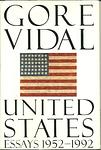Gore Vidal
Gore Vidal was an American writer and public intellectual known for his patrician manner, epigrammatic wit, and polished style of writing. Vidal's novels, essays, screenplays, and stage plays provided sharp, incisive commentary on American politics, history, society, and culture. Among his most famous works are the historical novels 'Burr' and 'Lincoln,' as well as the satirical novel 'Myra Breckinridge.' A prolific essayist, he also wrote extensively on political and social issues, often critiquing American imperialism and the military-industrial complex. His work and his outspokenness on various social issues made him a prominent figure in American literature and public debate.
Books
This list of books are ONLY the books that have been ranked on the lists that are aggregated on this site. This is not a comprehensive list of all books by this author.
-
1. Myra Breckinridge
This novel follows the story of Myra Breckinridge, a transgender woman who moves to Hollywood with the plan of both achieving stardom and challenging traditional gender roles and sexuality. The protagonist uses her wit, charm, and sexual appeal to manipulate those around her to further her own ambitions. The book is a satirical exploration of gender, sexuality, and the American Dream, set against the backdrop of 1960s Hollywood.
-
2. Burr
"Burr" is a historical novel that reexamines the life and times of Aaron Burr, the third Vice President of the United States, who is most famous for killing Alexander Hamilton in a duel. The narrative is presented in the form of a fictional memoir written by Burr's private secretary, which provides a counterpoint to the traditional portrayal of Burr as a villain. The book explores Burr's political career, his relationships, and his role in the founding of the United States, with a focus on his controversial actions and the complex dynamics of the early American republic.
-
3. Creation
The novel is a sweeping historical epic that takes readers on a journey through the ancient world, as seen through the eyes of a fictional Persian diplomat. The protagonist, who serves under King Darius and later his successor Xerxes, engages in philosophical and theological debates with some of the era's most influential figures, including Confucius, Socrates, and the Buddha. His travels and experiences provide a panoramic view of the political and cultural landscapes of the time, exploring the nature of power, belief, and the human condition. The book blends real historical events and personages with a richly imagined narrative, offering a unique perspective on a formative period in human history.
-
4. Williwaw
This novel is a gripping maritime adventure set in the treacherous waters of the Alaskan coastline during World War II. It follows the story of two young brothers who are left in charge of a Navy patrol boat while their commander is away. As they navigate the challenges of leadership and survival against the backdrop of the williwaw—a sudden and violent storm common in the region—their resilience, ingenuity, and bonds are tested. The narrative combines elements of suspense, natural danger, and the complexities of growing up under extraordinary circumstances, marking an impressive debut from its author.
-
5. Julian
This historical novel is a first-person narrative told through the eyes of Roman Emperor Julian the Apostate, the last non-Christian ruler of the Roman Empire. The story is presented as a series of letters and diary entries detailing Julian's life from his childhood to his death, including his rise to power, his attempts to restore paganism in the empire, and his military campaigns. The book paints a complex portrait of Julian, exploring his philosophical beliefs, his relationships, and his inner struggles.
-
6. United States: Essays 1952-1992
This book is a collection of essays written over a 40-year period, providing an insightful commentary on the political, historical, and cultural landscape of the United States. The author's sharp wit and incisive analysis are evident as he discusses a wide range of topics, from literature and the arts to politics and public life. His observations on American society, its leaders, and its institutions offer a critical perspective on the evolution of the nation during the second half of the 20th century.
-
7. Lincoln
The book is a historical novel that delves into the life and presidency of one of America's most iconic leaders during the tumultuous years of the Civil War. Through a blend of factual history and fictional narrative, the story provides a rich portrayal of the political, personal, and moral struggles faced by the 16th President. The novel offers a vivid depiction of the era and the complex character of the President, as he navigates the challenges of governance, emancipation, and the quest to preserve the Union, all while dealing with his own personal tragedies and the contentious figures within his cabinet.






